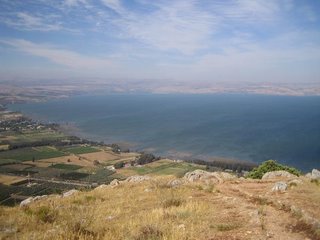 <--- Modern Day Sea of Galilee
<--- Modern Day Sea of GalileeSince some of you may not be familiar with the story of Jesus walking on the water, I will start this post by looking at the biblical account first. The story of Jesus walking on the water can be found in three of the four gospels. It is recorded in John 6:16-21, Mark 6:45-52, and Matthew 14:22-33. Since the account in Matthew has the most detail, I will use it as my base passage.
"Immediately Jesus made the disciples get into the boat and go on ahead of him to the other side, while he dismissed the crowd. After he had dismissed them, he went up on a mountainside by himself to pray. When evening came, he was there alone, but the boat was already a considerable distance from land, buffeted by the waves because the wind was against it. During the fourth watch of the night Jesus went out to them, walking on the lake. When the disciples saw him walking on the lake, they were terrified. "It's a ghost," they said, and cried out in fear. But Jesus immediately said to them: "Take courage! It is I. Don't be afraid." "Lord, if it's you," Peter replied, "tell me to come to you on the water." "Come," he said. Then Peter got down out of the boat, walked on the water and came toward Jesus. But when he saw the wind, he was afraid and, beginning to sink, cried out, "Lord, save me!" Immediately Jesus reached out his hand and caught him. "You of little faith," he said, "why did you doubt?" And when they climbed into the boat, the wind died down. Then those who were in the boat worshiped him, saying, "Truly you are the Son of God."
- Matthew 14:22-33
The Sea of Galilee is 650 feet below sea level, 145 feet deep and surrounded by hills. These physical features make it subject to sudden windstorms that cause massive waves.
Okay, so let me paint the picture for you. Earlier in the evening Jesus sent the disciples on ahead out to sea while he stayed back to pray. Now it’s roughly four o’clock in the morning and there’s a boat full of experienced fishermen out about 3 ½ miles from shore. They are tired from a long night out at sea and then the storm comes in. Because of the geographical features of this sea, fierce winds pick up and massive waves begin crashing around the boat. Verse 24 states that the wind was so strong that the boat couldn’t move against it.
Are you picturing this scene?
For arguments sake, let’s set aside that Jesus, as God incarnate obviously would have the ability to control the laws of nature (after all, he created them). Let’s bring Nof’s theory of ice on the Sea of Galilee into the picture and see what that looks like.
So how is it Jesus, in his sandals and robe, manages to maintain his balance on a piece of floating ice, through a storm fierce enough to hold back a fishing boat full of experienced fishermen, for 3 ½ miles? Have you ever walked on a frozen pond or an ice skating rink without ice skates? It’s incredibly difficult to do even under the best of conditions. I would argue that it would be impossible for a man to do what Jesus did, under the conditions argued by Nof.
But let’s look deeper. In verse 29 we see that Peter wanted to join Jesus on the water. After an invitation by Jesus, Peter gets out of the boat, and walks to Jesus. After a few moments Peter realizes the ferocity of the storm, and takes his focus off of Jesus and onto the waves around him and subsequently begins to sink.
Of course this raises questions for me. If Peter was on ice, why did he begin to sink? Furthermore, if there truly was ice on the water, wouldn’t Peter or the other disciples be able to see it as he readied himself over the edge? Wouldn’t one of them be able to counter Jesus’ apparent miracle with an eyewitness account of floating ice? Yet we have no hint that that happened.
Obviously Nof takes none of this into consideration. His biased approach of supporting his predetermined conclusion leaves no room for critical analysis or plain old common sense.
Coming from a background in law enforcement, I tend to put a lot more weight on eyewitness testimony than I do any other form of evidence. In analyzing this journal article, whether I look at problems with the study, or problems that arise when compared with the biblical account, I am left with one definitive and critical question: If Jesus was doing nothing more than merely surfing on a piece of ice, than why did all of the disciples worship him saying ‘Truly you are the son of God’”?
No comments:
Post a Comment